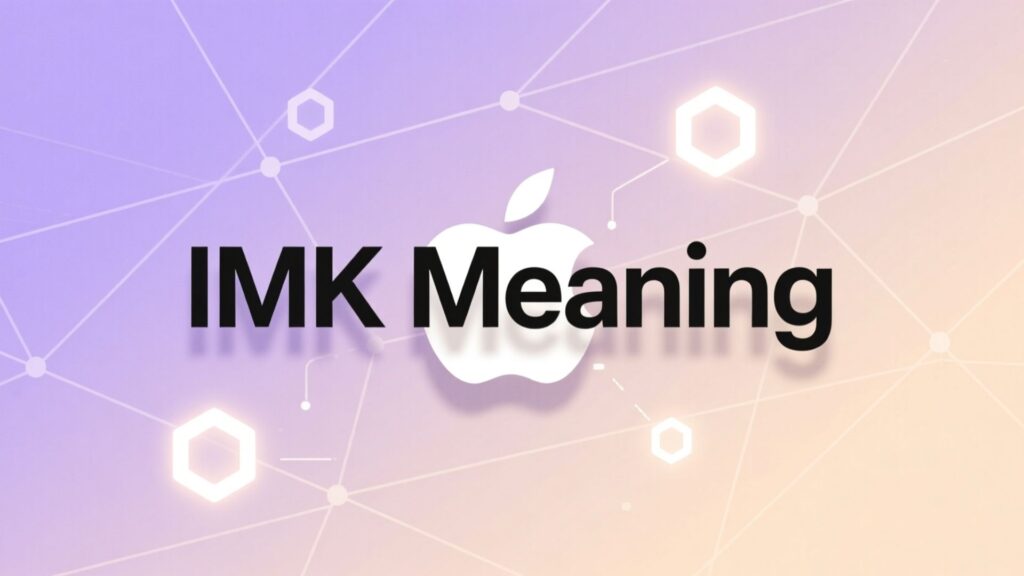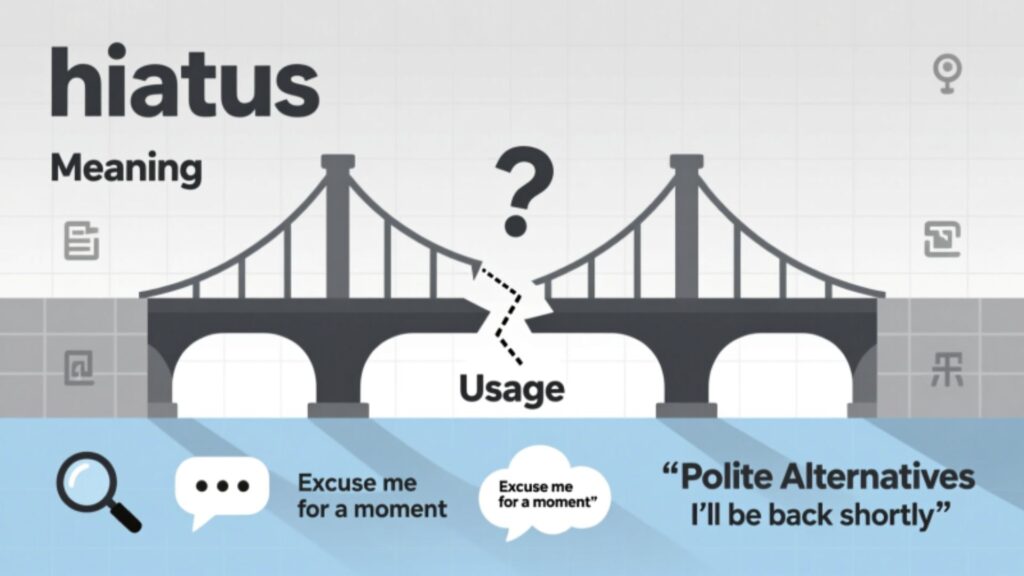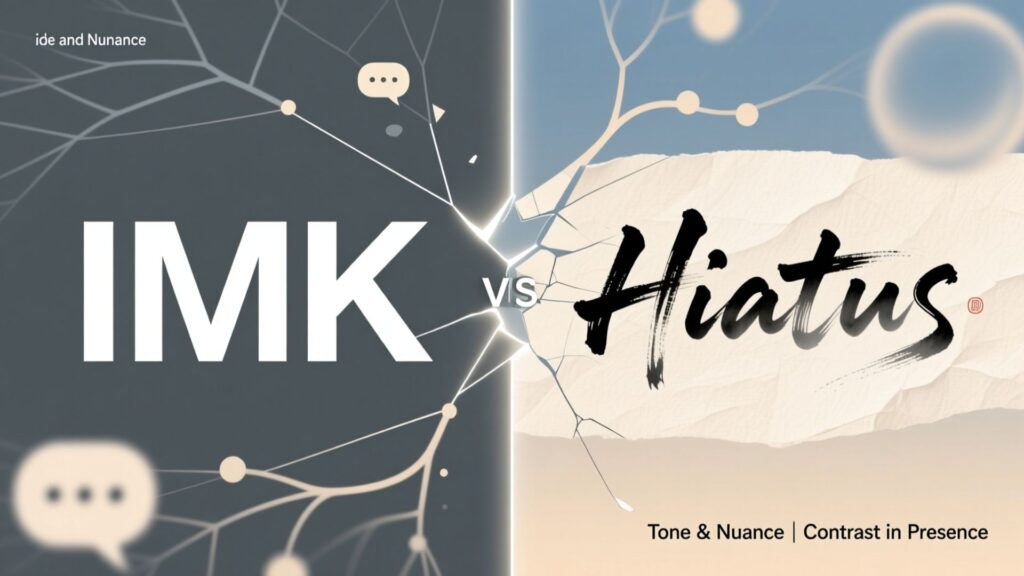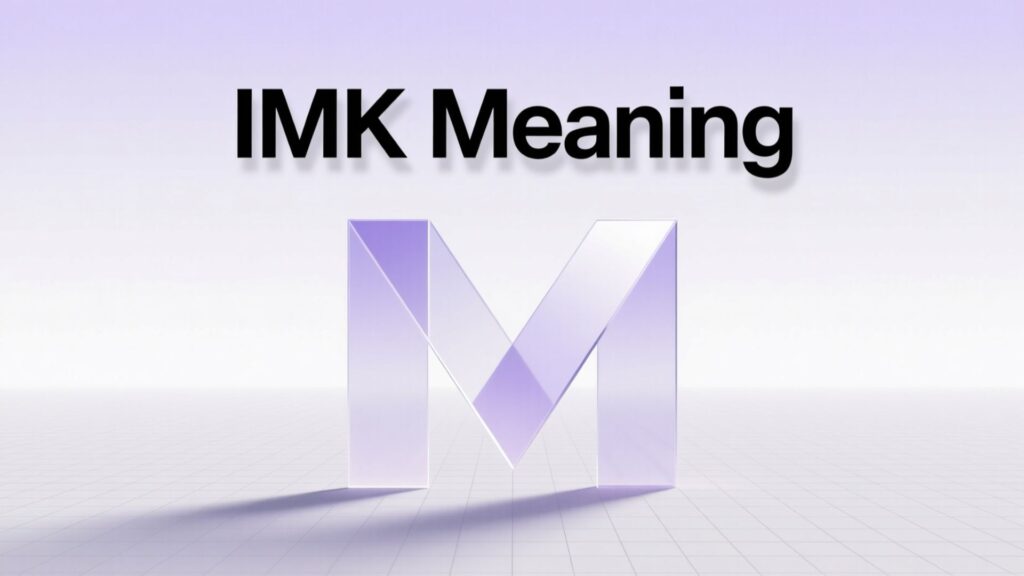Language online changes faster than ever before. Acronyms, abbreviations, and borrowed words pop up in text messages, on social media platforms like Snapchat, and even in professional conversations. Two such terms you may have come across are IMK and hiatus.
Both have their place in everyday conversation, but they carry different tones, contexts, and levels of formality. This guide explores IMK meaning, hiatus meaning, and how to use them confidently in your messages, workplace communication, and digital interactions.
What Does IMK Mean?

If you’ve ever paused while reading a chat and asked yourself, “What does IMK mean?” you’re not alone. IMK stands for “In My Knowledge.”
It’s typically used when someone wants to share information they believe is true but aren’t 100% certain about. Think of it as a softer version of “as far as I know.”
- Example:
Friend: “Is the meeting at 3?”
You: “IMK, it’s still scheduled for 3.”
IMK is not as widespread as acronyms like IMO (In My Opinion) or TBH (To Be Honest), but it has grown in popularity thanks to texting culture and quick online exchanges.
IMK Meaning in Text and Online Conversations
The phrase IMK meaning in text almost always refers to “In My Knowledge.” However, context matters. Some users also interpret IMK as “In My Knowing,” which conveys the same idea.
Here’s how IMK works in different platforms:
- Text Messages: Common when you’re unsure about details but still want to help.
- Social Media (Twitter, Snapchat, TikTok): Used casually, often as a disclaimer to avoid sounding too certain.
- Work Chats (Slack, Teams): Appears occasionally, but in professional spaces it’s better to use full phrases like “To my knowledge.”
If you’ve seen people asking “what does IMK mean Snapchat?” the answer is the same: it’s shorthand for “In My Knowledge.” People use it in stories, group chats, or private snaps when sharing uncertain info.
Examples of IMK in Use
Let’s break down how IMK shows up in different scenarios:
- Casual texting:
“IMK, she’s coming tonight but not sure if she’s bringing anyone.” - Snapchat story:
“IMK, the party starts at 9. Don’t quote me tho.” - Work chat (not ideal):
“IMK, the deadline is next Friday. Will confirm later.”
Notice how in casual settings IMK feels natural, but in professional conversations it can sound vague or careless.
Polite and Professional Alternatives to IMK
While IMK works for friends and peers, professional settings call for clarity. Instead of “IMK,” consider these polished alternatives:
- To my knowledge
- As far as I know
- Based on my understanding
- From what I’ve seen
These alternatives remove ambiguity and sound more respectful in workplace or academic environments.
What Does Hiatus Mean?

Unlike IMK, which is modern internet slang, hiatus is a much older word. The term comes from the Latin hiare, meaning to gape or open.
Hiatus refers to a pause, break, or interruption in activity.
It’s commonly used in entertainment and media industries:
- A TV series going on break between seasons.
- A musician taking time off between albums.
- A writer stepping away from publishing new work.
For example:
“The podcast is on hiatus until January.”
Usage and Context of Hiatus
Hiatus carries a more formal tone than everyday words like “break” or “pause.” It’s often chosen in public announcements, academic work, or entertainment updates.
Where you’ll see hiatus:
- Television/Film: “The show is on hiatus during the writers’ strike.”
- Publishing: “The blog went on hiatus after the editor left.”
- Workplace: “The project is on hiatus due to budget issues.”
- Personal life: “I’m taking a hiatus from social media to recharge.”
Hiatus doesn’t always mean forever. It usually signals a temporary stop with plans to return.
Examples of Hiatus in Everyday Life
Let’s look at real-life examples to clarify the nuances:
- Entertainment: “The series will return after a summer hiatus.”
- Workplace: “Research is on hiatus until funding resumes.”
- Personal: “I’m on a fitness hiatus, will restart next month.”
Polite and Professional Alternatives to Hiatus
Depending on tone, here are some alternatives to hiatus:
- Casual settings: break, pause, timeout, breather.
- Professional settings: sabbatical, suspension, intermission, interval.
Each carries a slightly different nuance:
| Alternative | Nuance/Usage Example |
|---|---|
| Break | Simple, everyday term. “I need a break from work.” |
| Sabbatical | Formal, academic/professional. “She’s on sabbatical this semester.” |
| Intermission | Common in entertainment. “There’s a 15-minute intermission during the play.” |
| Suspension | Formal, often negative. “Production was suspended due to safety concerns.” |
| Timeout | Informal, sporty. “Let’s take a timeout from this argument.” |
Tone and Nuance: IMK vs. Hiatus

Although unrelated in meaning, IMK and hiatus both reveal how language shapes tone.
- IMK: Suggests uncertainty, humility, or sometimes lack of confidence. Tone depends on delivery—can be friendly with peers but careless in formal contexts.
- Hiatus: Conveys seriousness, reflection, or formality. It frames a break as intentional rather than accidental.
How to Choose the Right Expression
Not sure when to use IMK or hiatus (or their alternatives)? Use this quick framework:
- Audience: Who are you speaking to? Friends, colleagues, or the public?
- Purpose: Is your message casual, informative, or professional?
- Tone: Do you want to sound relaxed, respectful, or formal?
Here’s a decision table for clarity:
| Setting | IMK Alternative | Hiatus Alternative |
|---|---|---|
| Casual Text | “As far as I know” | “Taking a break” |
| Social Media | “From what I know” | “On pause” |
| Workplace Chat | “To my knowledge” | “Temporary suspension” |
| Professional Email | “Based on my understanding” | “Sabbatical” / “Project delay” |
| Public Statement | Avoid IMK; be precise | Use hiatus or professional equivalent |
Case Studies: Using IMK and Hiatus in Real Scenarios
Case Study 1: Workplace Communication
A colleague asks in Slack: “Is the client call still scheduled for tomorrow?”
- Casual response: “IMK, yes.”
- Better response: “To my knowledge, it’s confirmed for 2 PM.”
The second option sounds more professional and reliable.
Case Study 2: Social Media Announcement
A creator posts on Instagram: “I’m taking a short hiatus to focus on mental health. Be back soon!”
- Using hiatus here signals seriousness and intentionality.
- Simply saying “I’m taking a break” may sound lighter and less official.
Case Study 3: Personal Chat on Snapchat
Friend: “Do you know if the concert is canceled?”
You: “IMK, it’s still happening.”
This casual use of IMK works perfectly because the context is informal.
Common Mistakes to Avoid
Even though IMK and hiatus are easy to use, here are pitfalls to watch for:
- Overusing IMK: Can make you sound uncertain or unconfident. Better to use sparingly.
- Using hiatus for permanent endings: Hiatus implies a pause, not a permanent stop. If something ends completely, use “canceled” or “ended.”
- Professional misuse: Dropping IMK in formal emails or announcements can feel unprofessional.
Summary and Key Takeaways
- IMK meaning: “In My Knowledge,” used mostly in casual texts and social media. Best avoided in formal writing.
- Hiatus meaning: A pause or break, often formal, with strong use in entertainment, work, and personal contexts.
- Use alternatives wisely: Match your choice of words to audience, tone, and purpose.
- Practical rule: IMK works with friends; hiatus works in formal or semi-formal contexts.
Final thought: Language shapes how others see you. Whether you’re dropping an IMK in a Snapchat chat or announcing a hiatus from work, choosing the right expression makes your message clearer, more respectful, and easier to understand.
Bugti is the founder of Quoethint.com, a hub for English language tips, writing advice, and grammar guidance. With years of experience in English studies and a passion for clear communication, Bugti created this platform to make grammar and writing easy to understand for everyone.
